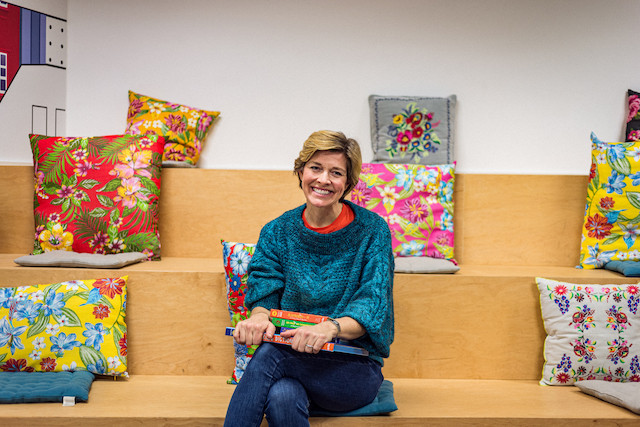The four books--which centre on zoo, camping, ocean and space themes--were translated by Luxembourgish language teacher Jeannine Weis and produced by four-time Grammy award-winner and company co-founder Jesse Lewis. And, according to Ta-Da! Language Productions CEO and co-founder Michelle Glorieux, moving from the initial concept to a final product took under two weeks.
That’s a feat for any company, but even more impressive? “We have a great team, working for zero pay for three years,” Glorieux told Delano during a recent interview.
Passion for bilingual education
It’s clear that Ta-Da!’s work is a labour of love. The company, in their own words, “magically weaves paper technology, art, words, storytelling, sound and music for children ages 0-12+ to bring native speakers to children so that they may learn languages & culture.”
Glorieux says the idea to produce sound books was nearly an “accident”. She describes a “super intense” experience while teaching in Europe, seeing youngsters struggling in a bi- or multilingual environment. “The biggest issue was a lack of vocabulary,” she says. “The students were stressed, they were not enjoying it.”
Glorieux, a Nashville native with a background in teaching and journalism, is a self-described “tech nerd”, someone who has always taken an interest in languages and culture. She grew up “an Army brat” and has lived and worked on three continents, including a 7-year stint in Luxembourg that ended three years ago. She has since moved back to the grand duchy, with the company currently in the process of registering here and based at the House of Startups. She had plenty of ideas on how to improve language education for children and was surprised to discover that the type of sound books she wanted to create didn’t really exist in the US.
Ta-Da! was set up in Silicon Valley, California, where the team developed a robust network of developers, techies and researchers, including at Stanford University. At the start, Glorieux says, “We were developing it and realised we didn’t know quite how to do it yet, but we kept plugging along, and it snowballed into motion.”

The Luxembourg sound shoot Photo: Ta-Da! Language Productions
Today their products include a language and adventure series, geared towards kids age 0-5+, and a talking dictionary series for ages 6-14+. “The dictionary alone includes 10,000 sound files, and it looks like a normal book,” Glorieux says. The former series, upon which the new Luxembourg books are based, include 12 words pronounced by native speakers as well as 12 original songs, and has so far been produced in German, French, Spanish, Mandarin and English.
Behind the products are team members with children, full-time jobs, volunteers, some even occasionally have experienced burnout with their workload. But the common denominator driving them all? Their commitment to children, culture and education.
Funding gap
Ta-Da! Language Productions is expecting to make a few big announcements in the coming weeks, Glorieux says. She’s aiming to finalise a deal to bring AI into their paper books and has already been in talks about making the first interactive sound dictionary for Luxembourgish.
But that’s not all. The company has raised €250,000 but aims to reach €2m and, if the €1m grant she’s hoping goes through does, that leaves the company with a €750,000 gap, so she has been busy reaching out to business angel networks.
In October, Ta-Da! Announced a multi-year agreement with Ingram Content Group, a publisher which will begin global sales and distribution for the sound books.
“We have a huge distribution contract that most dream of,” she says, “but we need marketing money, videos made, and to pay our team.”
Glorieux says that she’s in talks about a minimum order for local bookseller Ernster, which could be the first to distribute the books locally. She envisions Ta-Da!’s technology could even be put to use in interactive displays at local museums, for example. As long as someone can finance the upfront costs, Glorieux says, she’s convinced she can make a lot happen, and she has big ideas about embedding sound into posters, flashcards and more. As she did in the US and has previously done in Luxembourg, she hopes to continue organising roundtables, e.g. for teachers, to hear their needs and see if products can be developed to fit specific learners’ needs, however broad those are.
